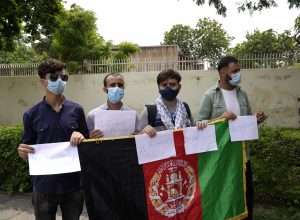With the inevitable fall of Panjshir this week, the Taliban’s takeover of Afghanistan is now complete. Among the many countries that are now faced by a daunting strategic challenge is India, which is left with few friends in Afghanistan.
In their quest to establish international legitimacy, the Taliban have already identified where they stand in regional geopolitics. Many of their preferred partners are countries that have been far less friendly to New Delhi than the United States. Last week, the head of Pakistan’s Inter-Services Intelligence (ISI) flew to Kabul for an unusually well-publicized visit. Reports have suggested that the Taliban have also extended invites to Pakistan, Turkey, Qatar, Russia, China, and Iran to witness the formation of their government.
In their early statements and dialogue with Indian officials, the Taliban had assured India of a policy of non-interference in Kashmir. But shortly after their ascendancy, the Taliban watered that down and lent some credence to New Delhi’s biggest fear: that an Afghanistan run by the Islamist group could end up as a safe haven for terrorist organizations targeting Kashmir. In a recent interview with the BBC, Taliban spokesperson Suhail Shaheen said that his group intends to “raise [its] voice for Muslims in Kashmir.”
Yet, despite India’s unbridgeable differences with the Taliban, New Delhi still has an opportunity to engage with the group in a manner that might take care of its own strategic interests.
Analysts everywhere are rightly skeptical that the Taliban have not changed their uncompromising ideology; women’s rights are already being trampled upon by Taliban fighters in different parts of the country. But the world around the Taliban has changed since their brutal reign during the 1990s.
During their five-year rule from 1996 to 2001 – and the many years of their rise prior to that – the Taliban were funded and sponsored primarily by the oil-rich Arab monarchies led by Saudi Arabia. But as the years wore on, those ties steadily soured, starting in 2009. That year, the then Saudi intelligence chief Prince Muqrin bin Abdulaziz expelled the Taliban’s political envoy Tayyib Agha, after the latter refused to publicly denounce al-Qaida.
Now in power, the Taliban has found itself cut off by its erstwhile sponsors. Last month, a Taliban leader denounced Saudi Arabia’s dominant Wahhabi ideology, which had inspired the group back in the 1990s, when it massacred close to 15,000 Shia Muslims. Meanwhile, Saudi Arabia became among the earliest countries to evacuate its embassy in Kabul, even as the Taliban were capturing the country.
The loss of patronage from the Gulf does not bode well for the Taliban, as they take over a country that is in the grip of a crippling economic crisis. During their early bid to forge ties with the outside world, the Taliban have become increasingly dependent on Iran, Pakistan, and China. Yet, for the sake of greater strategic autonomy, the Taliban are likely to search for new development partners. Just this week, Shaheen appealed to Germany to “encourage its entrepreneurs to come and invest” in Afghanistan.
These economic compulsions also open up an opportunity for New Delhi to fill in – and it already has a head-start over everybody else. Through the last two decades, India has built a significant presence as a development partner in Afghanistan, building both goodwill among the Afghan people as well as gaining important grassroots knowledge. Both factors can make India competitive, regardless of who is in power in Kabul.
According to estimates, India’s total investment in the country amounts to more than $3 billion, including critical infrastructure such as roads, dams, electricity lines, and other projects. The Taliban have already indicated that they are hoping for more.
The challenge for India, however, will be political. In a bid to secure these interests, New Delhi has made efforts in recent times to engage with the Taliban. Yet, these are already being undercut by domestic politics back home.
As many important Indian states head to the polls in a few months, leaders from the ruling Bharatiya Janata Party (BJP) have been seeking to leverage the fears sparked off by the rise of the Taliban. But that means rhetoric targeting the Taliban. Late last month, a BJP leader accused rivals in the state of West Bengal of having a “Talibani mindset.” Elsewhere, another BJP lawmaker blamed inflation on the Taliban. The Taliban’s own comments on Kashmir have only added fuel to the fire.
As it tries to evaluate its limited options in Afghanistan, New Delhi is caught in a delicate balancing act. There is good reason for India to shun the Taliban, driven both by domestic politics as well as moral compulsions. Yet, to manage its own strategic interests, India must find a way to engage the Taliban. It already has plenty of leverage to make use of.

































